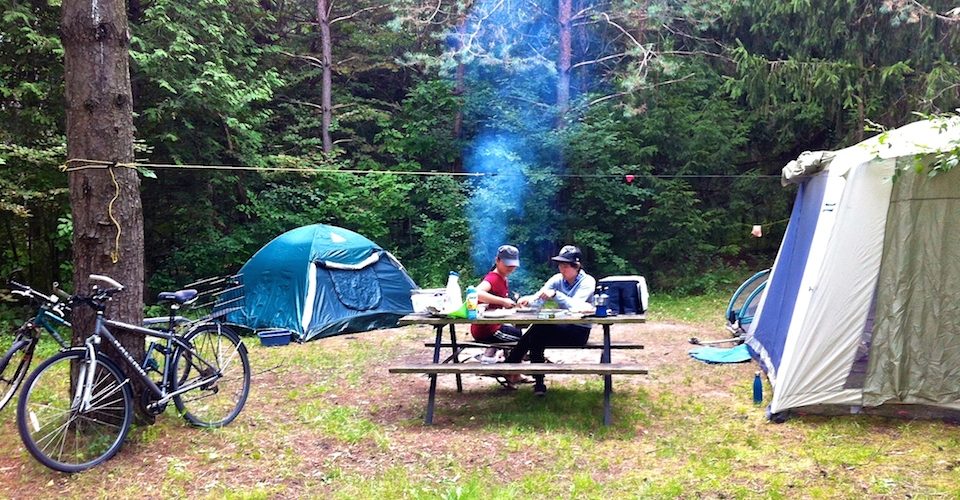For most people, a camping weekend involves loading up the car with gear and making a grueling trek on the 400-series highways. But the cumulative impact of all those vehicles actually degrades the wild lands in our conservation areas, provincial and national parks that we’re trying to protect. Air pollution from exhaust, noise pollution, highway construction and impacts to local ecosystems – wildlife mortality in areas adjacent to wetlands, for eample – make it a destructive way to enjoy our natural heritage.
For most people, a camping weekend involves loading up the car with gear and making a grueling trek on the 400-series highways. But the cumulative impact of all those vehicles actually degrades the wild lands in our conservation areas, provincial and national parks that we’re trying to protect. Air pollution from exhaust, noise pollution, highway construction and impacts to local ecosystems – wildlife mortality in areas adjacent to wetlands, for eample – make it a destructive way to enjoy our natural heritage.
Add to that the record high gas prices and extraordinary levels of construction and traffic congestion, and leaving the car at home starts to look like an attractive option. While our local transit networks can leave a lot to be desired, they can actually offer a cheap and convenient alternative to car camping. It does take a bit more organisation and planning, but can be a rewarding and relaxing alternative to the car – not to mention cheaper!
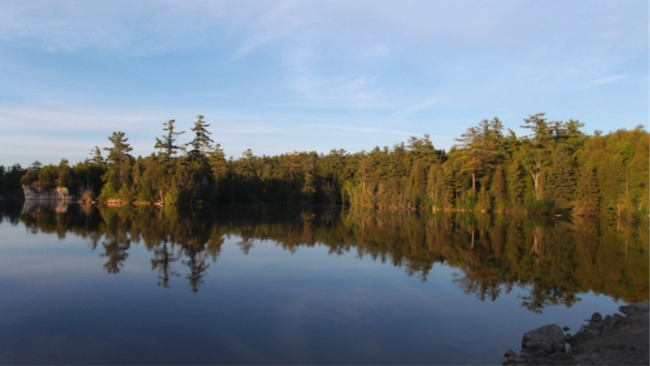
A gorgeous sunset is much easier to enjoy when you’re not dreading the drive home on Sunday.
Photo: Dan Beare
Torontonians can take the TTC to nearby Glen Rouge campground, located in Rouge Park, soon to be Canada’s first and only National Urban Park. Kitchener-Waterloo residents can take the GRT to Laurel Creek Conservation Area. GO Transit opens up further opportunities, such as Rockwood Conservation Area outside of Guelph, which I review below.
If you want to spend a bit more time and money you can visit Bruce Peninsula National Park, Six Mile Lake, Killarney and Algonquin using the ParkBus service, or other destinations throughout the province using the BikeTrain service. Keep in mind these parks are often remote and in bear country. I would suggest a local trip first if you’re new to such adventures. You can read A\J’s review of the ParkBus camping experience here. Let us know what options there are in your neck of the woods in the comments!
Let’s GO to Rockwood
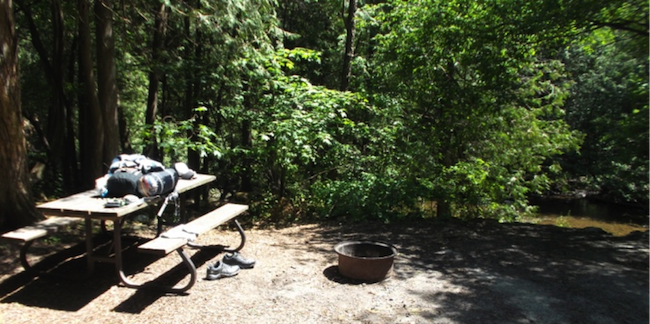
Rockwood Conservation Area, accessible by GO Transit.
Photo: Dan Beare
Recently my partner and I made our way to nearby Rockwood, Ontario, for a night of camping. We left Toronto on the 31 Kitchener GO bus for just $25 round-trip each. The bus stop is conveniently located right outside the entrance to the park and after registering at the park gate it was a brief hike to our campsite, which we had reserved ahead of time online. Just a few hours after departing downtown Toronto we were on the water canoeing Rockwood Conservation Area, enjoying wildlife like cliff swallows and blue herons.
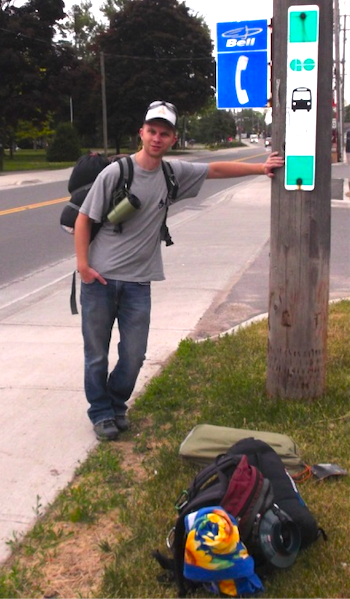
Waiting for the GO bus. What you see here is
all the gear required for a 1-night stay (except food).
Amenities including drinking water, firewood, ice, electric washrooms and warm showers are available in the park. The park itself offers two interpretive hiking trails through unique geological features, spectacular cliffs and caves, the ruins of an old woolen mill, as well as canoe rentals, fishing, swimming, and even miniature golf. The park is small enough that walking was possible, although we could have brought bikes on the GO bus bike racks (no bike rentals available in the park). In town, less than a 30-minute walk away, there is a convenience store, restaurant, hardware store, banks and a grocery store. This allowed us to buy what food we needed once we had arrived in Rockwood so we didn’t have to haul it with us on the bus.
Tips for Car-Free Camping
To make sure you’d be comfortable going car-free perhaps try a walk-in campsite first; many provincial parks offer this option, where you park your vehicle a short distance from the campsite and carry your gear in. Chances are if you can survive a walk-in site you’ll be fine, and it’s useful for determining what gear you don’t really need to bring. If you’ve never been camping before check the Ontario Parks website for information. If you don’t want to buy expensive equipment Mountain Equipment Co-op offers competitive rates on the rental of tents, sleeping bags, food barrels and backpacks. If you’re lucky enough to still be a university student, join the Outers Club (small fee required) to take advantage of cheap rentals for stoves, sleeping bags, first aid kits and lanterns.
When packing the trick is to bring as little as possible. For anyone who has gone interior hiking or canoeing this is knowledge quickly learned after navigating through difficult portages. There are plenty of websites and YouTube videos with tips for minimizing equipment to reduce weight. Consider not bringing a stove and fuel and instead do most of your cooking over the fire. Some parks have food storage lockers available for a refundable deposit so that car-free campers can store food overnight without worrying about attracting bears and raccoons, otherwise a food barrel is a good idea.
Finally, it is important to realize that car-free camping requires a significant amount of planning and logistics, mostly because the amount of equipment you can bring is limited to how much you’re willing to carry. If you’re not bringing a bike be sure to pick a destination that is relatively walkable! You can use Google Maps to plot distances using the walking feature (see example here). Severe weather or personal injuries can lead to danger so tell people where you’ll be going and bring a cell phone, radio, and always remember a first aid kit.
Good luck!
Resources
Check out the links below for parks close to the GTHA suitable for car-free camping. Let us know your favourite car-free camping locations in the comments.
- Camping In and Around Toronto (BlogTO)
- Toronto & Region Conservation camping information
- Grant River Conservation Authority camping information
- Valens Lake Conservation Area
- All Ontario Conservation Areas with campgrounds
Editor’s Note:
Purely by coincidence, I had my own inaugural car-free camping experience this weekend, a 40-minute leisurely bike ride from downtown Kitchener to Laurel Creek Conservation Area in north Waterloo. If you’re lucky enough to have a campground within biking distance – especially if the route is mostly flat trails – and someone strong enough to haul your gear in a bike trailer (thanks Janice!), I highly recommend it! – Laura McDonald
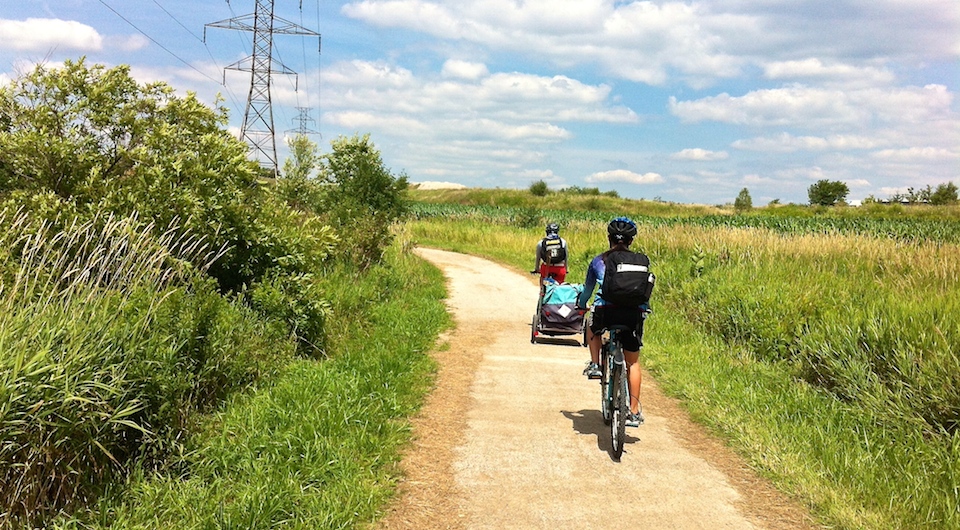
En route to Laurel Creek via the Laurel Trail.
Photo: Laura McDonald
Dan is an environmental professional currently living in Toronto. Dan has previously published in Municipal World and Environmental Science and Engineering. He specializes in energy, transportation, and climate change policy, corporate sustainability, and environmental planning and assessments. He recently completed a Masters of Environmental Applied Science and Management at Ryerson University and has a Bachelors' degree in Environment and Business from the University of Waterloo.


